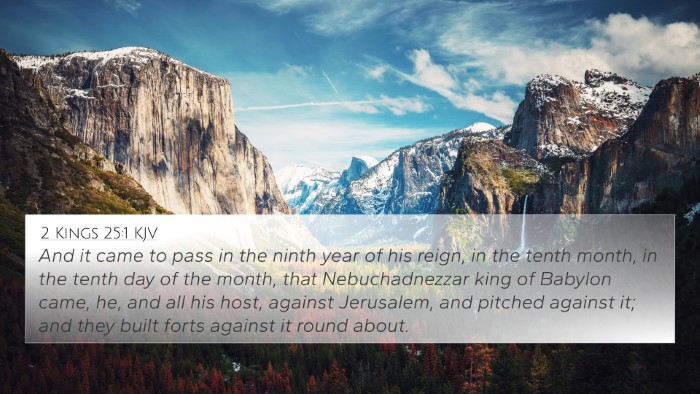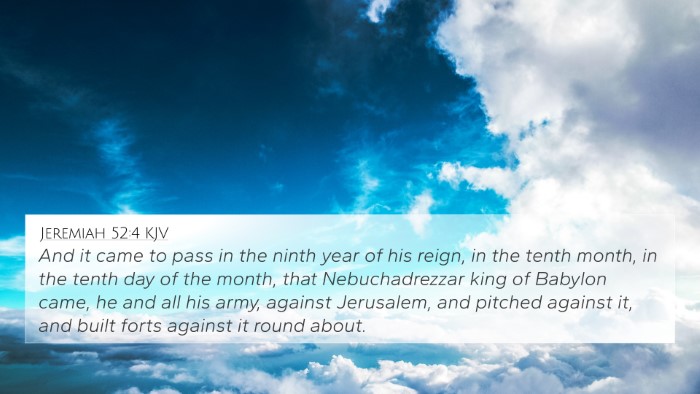Ezekiel 24:2 - Summary and Interpretation
Ezekiel 24:2: "Son of man, write thee the name of the day, even of this same day: the king of Babylon set himself against Jerusalem this same day."
Understanding the Context
This verse occurs in a historical context where the prophet Ezekiel receives a message from God regarding the impending siege of Jerusalem by the Babylonians. The emphasis on the precise date highlights the certainty and significance of the prophecy being fulfilled.
Commentary Insights
-
Matthew Henry:
Henry emphasizes that the specific mention of the day serves as a poignant reminder of the calamity that is to befall Jerusalem. The recording of time in prophetic texts underscores God's sovereignty over history.
-
Albert Barnes:
Barnes reflects on the symbolic nature of names and dates in Scripture, affirming that God's directives often involve a keen awareness of time as part of divine judgment. The verse marks the fulfillment of prophecy against Jerusalem.
-
Adam Clarke:
Clarke notes that this day is not just a day in history but is pivotal for the people of Israel. The Babylonians' aggression marks a turning point in their national and spiritual existence, highlighting their disobedience.
Thematic Implications
The mention of "the day" can be seen as part of a larger theme of judgment prevalent throughout Scripture. The precision with which God communicates through Ezekiel mirrors similar accounts of divine judgment in other parts of the Bible.
Related Cross-References
- Jeremiah 25:8-9: God's warning of judgment through Jeremiah parallels Ezekiel's messages, emphasizing the coming destruction of Jerusalem.
- Ezekiel 1:1-3: The urgency of God's call to Ezekiel at the time of crisis is echoed at the beginning of the book.
- Lamentations 1:1: The book of Lamentations offers a reaction to the events leading to the fall of Jerusalem.
- 2 Kings 25:1-2: Direct account of the siege of Jerusalem by the Babylonian king.
- Daniel 1:1: References the same historical context concerning Babylon's actions against Jerusalem.
- Amos 3:7: The LORD reveals His plans to the prophets, resonating with Ezekiel's task to proclaim judgment.
- Isaiah 39:5-7: Preceding warnings regarding Babylon's influence over Israel provide deeper insight into Ezekiel’s prophecies.
Exploring Connections with Other Scriptures
This verse serves as a crucial point of reference for understanding broader themes of divine judgment and restoration throughout the Bible. The connections can be analyzed through:
- Linking Bible Scriptures: Identifying similar themes in prophetic literature.
- Bible Verse Parallels: Noting the continuity between the prophecies of judgment and eventual hope.
- Comparative Bible Verse Analysis: Understanding how various texts interact to present God's narrative of justice and mercy.
Cross-Referencing Methods
Utilizing tools for Bible cross-referencing can enhance the study of this verse. Resources such as a Bible concordance or a Bible cross-reference guide allow readers to explore related content and identify connections across biblical texts.
Practical Application
For those studying Ezekiel 24:2, it is beneficial to consider why God emphasizes the importance of marking time and recording events. The call to immure knowledge as a divine warning invites personal reflection on the themes of obedience and consequence in the life of faith.
Sermon Preparation and Study Insights
This verse, steeped in prophetic urgency, can be crucial for sermon preparation. Understanding the historical context and thematic relevance allows for deep dives into God’s ongoing relationship with His people. Techniques such as cross-referencing Bible study methods can yield rich insights for both personal and communal gatherings.
Conclusion
In Ezekiel 24:2, the prophet’s clear communication of God's message encapsulates a moment of severe judgment and a pivotal shift in the history of Israel. As we glean from commentaries and engage in careful cross-referencing, we gain a richer insight into the interplay of divine judgment, human response, and the hope of restoration that permeates the entire biblical narrative.








